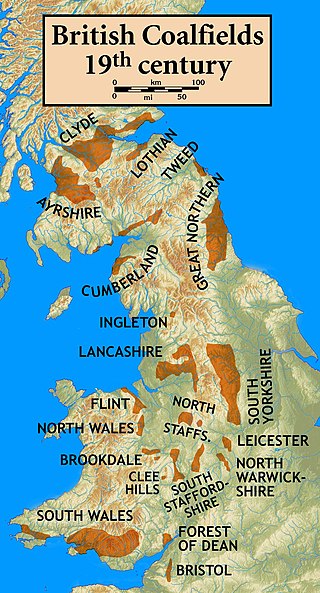Related Research Articles

Northumberland is a ceremonial county in North East England, bordering Scotland. It is bordered by the Scottish Borders to the north, the North Sea to the east, Tyne and Wear and County Durham to the south, and Cumbria to the west. The town of Blyth is the largest settlement. Northumberland is the northernmost county in England.

Geordie is an English dialect spoken in the Tyneside area of North East England, especially connected with Newcastle upon Tyne, and sometimes known in linguistics as Tyneside English or Newcastle English. The Geordie dialect and identity are primarily associated with a working-class background. A 2008 newspaper survey found the Geordie accent to be perceived as the "most attractive in England" among the British public.

Pitmatic – originally 'pitmatical' – is a group of traditional Northern English dialects spoken in rural areas of the Great Northern Coalfield in England.

Robert White Creeley was an American poet and author of more than sixty books. He is usually associated with the Black Mountain poets, though his verse aesthetic diverged from that school. He was close with Charles Olson, Robert Duncan, Allen Ginsberg, John Wieners and Ed Dorn. He served as the Samuel P. Capen Professor of Poetry and the Humanities at State University of New York at Buffalo. In 1991, he joined colleagues Susan Howe, Charles Bernstein, Raymond Federman, Robert Bertholf, and Dennis Tedlock in founding the Poetics Program at Buffalo. Creeley lived in Waldoboro, Buffalo, and Providence, where he taught at Brown University. He was a recipient of the Lannan Foundation Lifetime Achievement Award.

Basil Cheesman Bunting was a British modernist poet whose reputation was established with the publication of Briggflatts in 1966, generally regarded as one of the major achievements of the modernist tradition in English. He had a lifelong interest in music that led him to emphasise the sonic qualities of poetry, particularly the importance of reading poetry aloud: he was an accomplished reader of his own work.

Northumbrian dialect or Northumbrian English is any one of several traditional English dialects spoken in the historic counties of Northumberland and County Durham. The term Northumbrian can refer to the region of Northumbria but can also refer specifically to the county of Northumberland. This article focuses on the former definition and thus includes varieties from throughout the wider region.

The Northumbrian burr is the distinctive uvular pronunciation of R in the traditional dialects of Northumberland, Tyneside ('Geordie'), and northern County Durham, now remaining only among speakers of rural Northumberland, excluding Tyne and Wear. It is one of the few rhotic dialects left in England.

Robert Anderson (1770–1833), was an English labouring class poet from Carlisle. He was best known for his ballad-style poems in Cumbrian dialect.
John Bell was a printer and avid collector of ballads who played a major part in the recording of the lyrics of popular songs in the north east of England.
Robert Gilchrist (1797–1844) was a Tyneside poet, born in Gateshead in County Durham. Possibly his best-known work is "The Amphitrite" –.
Henry Robson was a Tyneside concert hall poet, songwriter and performer in the late 18th and early 19th century. His best known works were perhaps the narrative poem "The Collier's Pay Week", and a poem "The Northern Minstrel's Budget", describing the repertoire of a travelling fiddler and piper.

John Harbottle was a Newcastle businessman, songwriter and angler in the late 19th century. He was also an active member of the Northumberland and Newcastle Angling Clubs and singer/performer at the club meetings. His most famous song is probably "Streams of the North" which won the local newspaper prize in 1891.
John William Chater (1840–1885) was a prominent 19th-century Tyneside publisher, printer and bookseller, with premises in the centre of Newcastle.
Chater's Canny Newcassel Diary and Remembrancer was a book, published in 1872 by John W. Chater. It contained a mixture of "songs, poems, humorous tales, jokes, conundrums, tongue twisters and other items of frivolity".
Robert Elliott was a mid to late 19th century miner and poet. He was from Choppington, Northumberland.

Henry Brewis (1932–2000) was a Northumberland born farmer, who developed his artistic talents into a successful side-line as a writer of tales, poems, artist, cartoonist and illustrator.

Canny Bit Verse is a book, written and published by poet Robert Allen from Northumberland, England, in 1994. It contains a variety of poems, which between them praise the valley of the North Tyne, talk about local village cricket, or tell of sad occurrences as in the "whee's deid" (obituary) column, and according to the sales details "and for those who don't know their cushat from their shavie (chaffinch), there's a glossary of dialect words".

The Church of St Cuthbert is a grade I listed building in Bellingham, Northumberland, owned by the Church of England. Parts of the church date to the 13th century and it survived the raids of the border reivers which burnt down many structures in the village. The structure consists of a nave, chancel and a large south chapel. The chancel is noted for having a remarkable roof consisting of strips of Lakeland slate. The graveyard contains the "Lang Pack", a tomb associated with a nearby country house robbery legend.
References
- ↑ "The Northumbrian Language Society". Archived from the original on 13 February 2012.
- ↑ "Woolshed 1 – 19 December 2008".
- ↑ Allen, Robert (1994). Canny Bit Verse: Illustrator Henry Brewis. R Allen. p. 128. ISBN 9780952464907.
- ↑ "Canny Bit Verse - the book". Archived from the original on 21 April 2013.